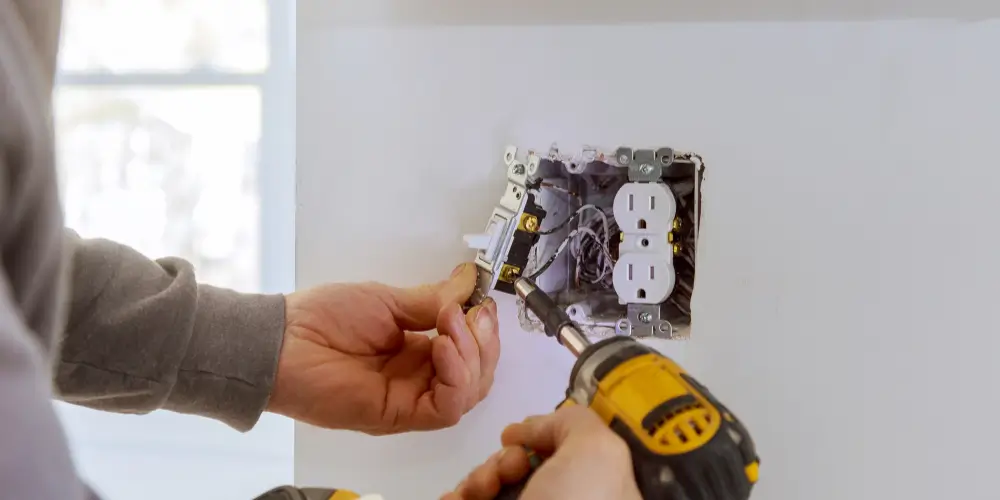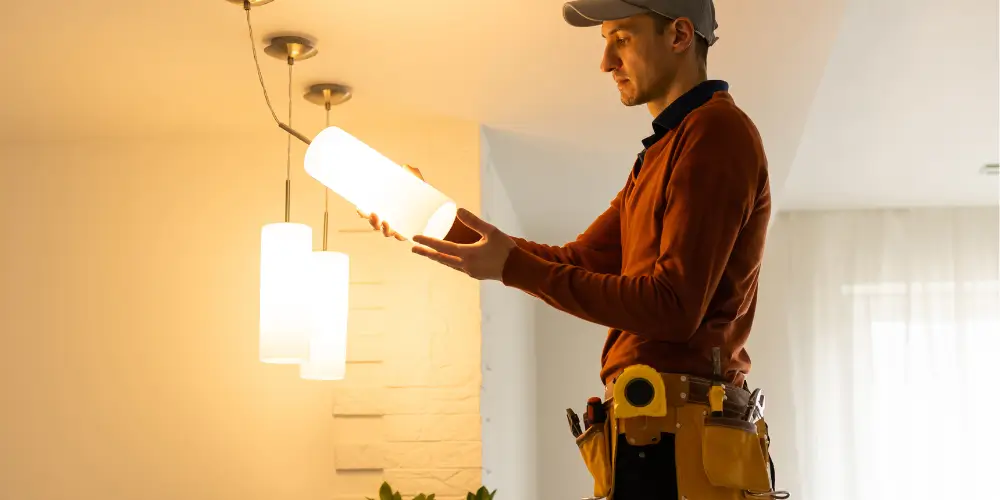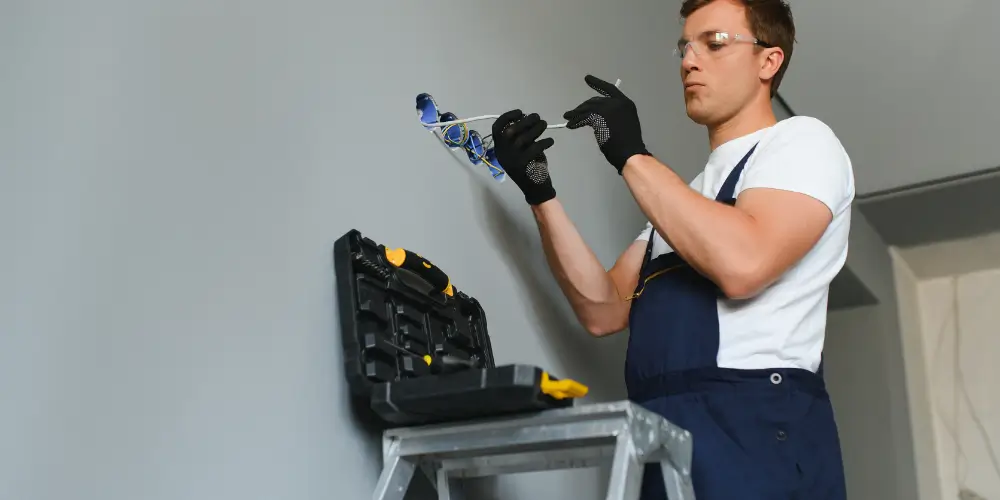Domestic installers are generally not authorized to issue Electrical Installation Condition Reports (EICRs) due to their limited scope of certification and training in basic residential installations rather than the thorough evaluations required for EICRs. The issuance of EICRs is restricted to individuals with specific qualifications, such as a Level 3 certification in electrical installation, and who are accredited by recognized bodies like NICEIC or ELECSA. These qualifications guarantee proficiency in complex inspections necessary for identifying potential hazards and affirming electrical safety compliance. Understanding the critical expertise and legal requirements for issuing an EICR will highlight the importance of relying on fully qualified professionals. Further exploration provides insight into how professional adherence enhances safety and compliance.
Key Takeaways
- Domestic installers lack the necessary qualifications to issue EICRs, which require specific accreditation and Level 3 certification.
- EICRs are complex assessments that go beyond the basic installation skills of domestic installers.
- Only electricians accredited by recognised bodies like NICEIC or ELECSA are legally permitted to issue EICRs.
- Using domestic installers for EICR can lead to non-compliance with national electrical regulations and safety standards.
- Engaging a qualified electrician ensures the EICR is conducted properly, adhering to legal and safety requirements.
Table of Contents
Understanding EICRs and Their Requirements
An Electrical Installation Condition Report (EICR) is a formal document produced after an assessment of a property’s electrical installations to ensure they meet current safety standards.
The significance of EICRs cannot be overstated. They are essential in identifying any potential electrical safety issues that could pose a risk to occupants.
What Is an EICR?
An Electrical Installation Condition Report (EICR) is a formal document prepared by a qualified electrician or approved contractor which assesses the safety of electrical installations within a property. This assessment is essential as it identifies any deficiencies against the national safety standard for electrical installations.
The EICR process overview involves a thorough inspection. The electrician examines the condition of the electrical system against an EICR inspection checklist. This checklist includes a range of inspection points, such as wiring, fuse boards, protective devices, and bonding. The expert scrutinises each component to verify compliance with current electrical standards.
Common mistakes during the EICR process can compromise the integrity of the report. These may include overlooking minor defects that can escalate or misinterpreting wiring regulations. Such errors underscore the importance of hiring experienced and meticulous professionals to conduct these inspections.
The significance of an EICR report extends beyond mere compliance. It serves as a critical document that guarantees the ongoing safety and functionality of the property’s electrical infrastructure.
Regarding EICR renewal frequency, it is generally recommended that reports be renewed every five years for residential properties and, more frequently, for commercial spaces, depending on their usage and environmental conditions.

Why Are EICRs Important for Property Safety?
Electrical Installation Condition Reports (EICRs) are pivotal for maintaining the integrity of a property’s electrical infrastructure by ensuring the safety and compliance of electrical installations.
These detailed assessments serve as critical tools in identifying any potential hazards within an electrical system, thereby preventing unforeseen incidents that could endanger lives and cause property damage.
EICRs are conducted according to stringent EICR guidelines that include thorough property inspections.
These inspections meticulously evaluate the condition of electrical systems, ensuring they meet current safety standards. The process encompasses a series of compliance audits and risk assessments designed to detect deterioration, defects, and non-compliance with prevailing electrical regulations.
The importance of EICRs extends beyond immediate safety.
They are fundamental in ensuring the longevity of electrical installations and in safeguarding the property’s value. Compliance with these reports can also influence insurance policies, as many insurers require up-to-date EICRs to validate coverage.
In essence, EICRs are indispensable in establishing a reliable, safe, and compliant electrical environment.
Their rigorous application is essential for risk mitigation and represents a proactive approach to electrical safety and property management.
Who Can Legally Issue an EICR?
Specific qualifications are mandatory to legally issue an Electrical Installation Condition Report (EICR), underscoring the necessity for expertise in electrical safety and compliance.
The distinction between domestic installers and fully qualified electricians is significant, as only those with appropriate certifications and training are authorised to conduct these thorough assessments.
Understanding these differences is vital for ensuring that all electrical testing adheres to stringent regulatory standards, thereby safeguarding both property and human life.
Qualifications Required for Issuing an EICR
Issuing an Electrical Installation Condition Report (EICR) requires specific qualifications and a designated level of expertise. This essential document assesses the safety of electrical installations, ensuring they meet stringent standards and regulations.
The qualifications overview for professionals authorised to issue an EICR is strict, emphasising the need for thorough knowledge and understanding of the EICR process and the broader implications of electrical safety.
To legally conduct and certify an EICR, the following qualifications and credentials are typically necessary:
- Accreditation by a Recognised Governing Body**, such as the NICEIC**, ELECSA, or NAPIT, ensures adherence to the latest industry standards.
- Level 3 Certification in Electrical Installation: Ensuring the installer has an advanced understanding of electrical components and systems.
- Demonstrated Proficiency in Inspection and Testing**: Specific training courses that focus on the competencies required for effective electrical inspection.
- Professional Indemnity Insurance: To cover liability for the safety and compliance of the work performed.
- Continuous Professional Development: Keeping up to date with changes in regulations, technology, and best practices.
Understanding these requirements underscores the importance of certification. It highlights the crucial nature of installer responsibilities in maintaining electrical safety standards.
Why Compliance Matters in Electrical Testing
Recognising the stringent qualifications necessary for issuing an Electrical Installation Condition Report (EICR) naturally leads us to understand why maintaining compliance in electrical testing is not merely a regulatory requirement but a fundamental safeguard. This adherence to compliance standards guarantees that electrical installations are systematically evaluated against established safety regulations, thereby mitigating risks associated with electrical hazards.
The rigorous application of testing procedures and the consistent enforcement of certification requirements are essential to uphold the integrity and safety of electrical systems in residential, commercial, and industrial settings.
Electrical inspections, when executed in compliance with the pertinent standards, serve as a critical checkpoint for identifying deteriorations, defects, and non-compliances that could lead to severe safety incidents. A qualified professional’s role in this scenario is vital, as they possess the requisite expertise to interpret and apply the regulations effectively.
Without stringent compliance, the reliability of the EICR could be compromised, leading to overlooked hazards and subsequent liabilities.
In essence, compliance in electrical testing is not just about fulfilling legal obligations but about guaranteeing a high standard of electrical safety, which protects property and lives. It underscores the importance of having qualified professionals conduct these assessments to maintain these high standards.

Difference Between Domestic Installers and Qualified Electricians
Understanding the distinction between domestic installers and qualified electricians is vital when determining who is legally authorised to issue an Electrical Installation Condition Report (EICR).
Domestic installers typically focus on basic installations and maintenance within residential settings. In contrast, qualified electricians undergo more extensive training and certification processes, enabling them to handle complex electrical systems across various environments, not just homes.
Key differences include:
- Certification Importance: Qualified electricians possess a broader range of certifications that adhere to national electrical safety standards, which are essential for legally issuing EICRs.
- Electrician Training Differences: Extensive training in diverse electrical systems equips qualified electricians with the necessary skills to perform detailed safety assessments.
- Domestic Installer Roles: Limited to simpler, residential-focused tasks, lacking the credentials to conduct thorough electrical inspections required for EICRs.
- Electrical Safety Standards: Qualified electricians are trained to comply with rigorous safety standards that govern all types of electrical installations and testing.
- Testing Methodologies: A deeper understanding of advanced testing methodologies allows qualified electricians to evaluate and report the condition of electrical installations accurately.
Only those with adequate qualifications and adherence to stringent safety standards should issue EICRs to guarantee the integrity and safety of electrical installations.
Can a Domestic Installer Issue an EICR?
In the domain of electrical safety assessments, the qualifications and limitations of domestic installers are essential.
While domestic installers are integral to initial installations and minor electrical works, their authorisation to conduct and issue Electrical Installation Condition Reports (EICR) is bound by specific regulatory standards.
It is vital to understand these legal constraints to guarantee compliance and safety in electrical testing.
The Role of a Domestic Installer in Electrical Testing
Specific regulatory standards and professional requirements define the role of a domestic installer in electrical testing, particularly regarding their qualifications to issue an Electrical Installation Condition Report (EICR). Understanding the vital function of these professionals in maintaining electrical safety and compliance is fundamental for homeowners and the industry.
Homeowner Awareness
Educating homeowners on the importance of regular electrical inspections and the roles of certified professionals in these processes.
Electrical Testing Standards
Compliance with rigorous national standards is mandatory to guarantee the integrity and safety of electrical systems.
Domestic Installer Responsibilities
Trained to assess the safety and functionality of electrical installations in residential settings, guaranteeing that they meet current electrical testing standards.
Certification Importance
Holding the right certification is essential for a domestic installer to conduct EICRs legally. It emphasises the need for ongoing professional development and adherence.
These components highlight the significance of a domestic installer’s role in electrical testing and underline the necessity for proper training, certification, and adherence to the highest professional standards.
Legal Limitations for Domestic Installers
Evaluating the legal constraints faced by domestic installers, particularly regarding their authority to issue an Electrical Installation Condition Report (EICR), reveals a nuanced landscape governed by stringent regulatory frameworks.
The issuance of an EICR is not merely a procedural task. Still, it encapsulates a series of legal responsibilities and stringent safety standards, necessitating specific installer qualifications.
Legal stipulations mandate that only electricians qualified and competent in inspection and testing can undertake EICR processes. This is enshrined in regulations that prioritise electrical safety and the integrity of the assessment.
Domestic installers must demonstrate thorough knowledge and compliance with the latest wiring regulations and possess a qualification specifically in the fields of inspection, testing, and certification of electrical installations.
Regulatory compliance further dictates that these installers regularly update their skills and knowledge to align with evolving standards and technologies.
This guarantees that the EICR provided is both current and detailed, safeguarding the safety of electrical installations in residential settings.
Non-compliance undermines the safety protocols and exposes the installer to legal repercussions. This emphasises the critical nature of adhering to established guidelines and the importance of proper accreditation in the field of domestic electrical installation.

Regulations Governing EICR Issuance
The issuance of an Electrical Installation Condition Report (EICR) is strictly regulated under the BS 7671 Wiring Regulations, which guarantee that all electrical installations adhere to safety and performance standards.
Additionally, government guidelines for electrical safety provide a framework that specifies the qualifications and protocols that practitioners must follow to issue these reports legally.
Domestic installers must fully understand and comply with these regulations to maintain the integrity and safety of electrical assessments.
BS 7671 Wiring Regulations and Compliance
Understanding the BS 7671 Wiring Regulations is vital for anyone involved in the issuance of an Electrical Installation Condition Report (EICR). These regulations set the standards for electrical installation safety in the United Kingdom and are essential for guaranteeing that all electrical systems are inspected and assessed properly.
Compliance with these regulations is mandatory, guaranteeing the safety and efficiency of electrical installations.
Key elements of the BS 7671 that are particularly relevant to the issuance of an EICR include:
- Compliance Standards: Adherence to the latest BS 7671 guarantees that electrical installations meet current safety requirements.
- Installer Qualifications: Only qualified personnel with knowledge of these regulations should conduct electrical inspections.
- Wiring Safety: The regulations provide detailed guidance on safe wiring practices and materials.
- Regulatory Updates: BS 7671 is regularly updated to reflect the latest safety techniques and technologies.
- Electrical Inspections: Detailed criteria for inspection guarantee that all components are evaluated for efficiency and risk.
Mastery of these regulations is non-negotiable for professionals issuing an EICR. They form the backbone of responsible electrical practice and guarantee ongoing compliance with the highest standards of electrical safety.
Government Guidelines for Electrical Safety
Government regulations concerning electrical safety are fundamental in the issuance of an Electrical Installation Condition Report (EICR). These guidelines guarantee that electrical installations adhere to stringent safety and compliance standards, safeguarding both property and lives.
The specific regulatory framework, primarily derived from national electrical codes and supplemented by local statutes, dictates the methodologies and standards for installation regulations and routine testing procedures.
Understanding and implementing these regulations is vital for property management entities. The government mandates regular inspections and testing of electrical systems to maintain compliance and minimise risks associated with electrical faults.
The issuance of an EICR is not just a procedural formality but a critical evaluation that assesses the safety and longevity of electrical installations. Only qualified professionals who have demonstrated competence in accordance with these governmental guidelines are authorised to conduct these assessments and issue the necessary certification.
Moreover, these regulations are continuously updated to reflect the latest safety research and technological advancements in electrical installations. Compliance with these dynamic standards is imperative for maintaining the integrity and safety of electrical systems within residential, commercial, and industrial properties.

Risks of Unqualified Professionals Issuing EICRs
The issuance of Electrical Installation Condition Reports (EICRs) by unqualified professionals poses significant risks, including the potential for incorrect assessments that fail to identify existing electrical hazards.
Such oversights can lead to severe safety risks, compromising the integrity of the electrical system and endangering occupants.
Consequently, only adequately trained and certified electricians must conduct these evaluations to guarantee compliance with established EICR standards.
Potential Hazards of Improper Assessments
Although domestic installers may possess basic electrical knowledge, their qualifications often fall short of the rigorous standards required for issuing an Electrical Installation Condition Report (EICR). Their limited training may lead to improper assessments, which can have severe consequences.
The robustness required for thorough EICR evaluation guarantees the identification and mitigation of potential electrical hazards, adherence to safety standards, and accuracy in testing electrical systems. When these assessments are not conducted properly due to inadequate expertise, several risks emerge:
- Inadequate Detection of Electrical Hazards: Missed or underestimated issues could lead to fires or electrical shocks.
- Non-compliance with Safety Standards: Properties may not meet legal safety requirements, posing legal and financial risks.
- Compromised System Integrity: Incorrect evaluations can result in undetected deterioration or faults in the electrical system.
- Misleading Reports: This can lead to a false sense of security regarding the electrical system’s condition.
- Potential Legal and Insurance Implications: Failure to comply with required standards can result in denied insurance claims or legal actions.
These risks underline the importance of confirming that only qualified and competent professionals conduct EICRs to maintain system safety, compliance, and reliability.
Ensuring Compliance with EICR Standards
Guaranteeing that Electrical Installation Condition Reports (EICRs) meet established standards is essential to safeguarding both property and human lives. Compliance with these standards involves adhering to rigorous testing methodologies and electrical safety protocols.
Domestic installers must understand their responsibilities within this framework to prevent the severe consequences of non-compliance.
The issuance of an EICR by an underqualified or uninformed professional poses significant risks. These reports assess the safety and functionality of electrical installations, identifying any deficiencies that could lead to fire, electrocution, or other hazardous incidents.
An incorrectly performed EICR may overlook important faults or misjudge the severity of an issue, misleading property owners about the safety of their electrical systems.
Domestic installers must be thoroughly familiar with compliance procedures to guarantee that EICR standards are met. This includes extensive knowledge of the current wiring regulations and the ability to interpret and implement these standards effectively.
Furthermore, continuous professional development and certification in the latest electrical safety protocols are non-negotiable to maintain the integrity of EICR processes. Only with such expertise can the safety and compliance of electrical installations be reliably certified.
How to Verify if Someone Is Qualified to Issue an EICR
It is essential to scrutinise the certifications of professionals issuing an Electrical Installation Condition Report (EICR) to verify their qualifications.
Key certifications include membership in recognised electrical safety bodies such as the NICEIC, ELECSA, or NAPIT.
Additionally, confirming the individual’s industry accreditation guarantees they adhere to the latest safety standards and codes of practice.
Certifications to Look For
When verifying whether an individual is qualified to issue an Electrical Installation Condition Report (EICR), it is essential to confirm that the electrician holds the requisite certifications. This process guarantees adherence to certification standards, thorough knowledge of electrical qualifications, strict compliance with licensing requirements, familiarity with safety protocols, and proficiency in assessment procedures.
Here are key certifications to look for in a qualified professional:
City & Guilds 2391-52
Combines the inspection and testing of new installations with periodic inspection.
NIC EIC Registered
Indicates that the electrician is assessed annually to guarantee high standards of workmanship.
ELECSA
Provides Part P certifications, ensuring the electrician can self-certify compliance with building regulations.
NAPIT Full Scope
Membership demonstrates that the electrician is competent in all areas of domestic electrical work, including condition reporting.
These certifications signify that electricians have undergone rigorous training and evaluation, equipping them with the necessary skills to carry out EICR assessments efficiently and safely.

Importance of Checking Industry Accreditation
Verifying industry accreditation is vital when determining if an individual is qualified to issue an Electrical Installation Condition Report (EICR). This process guarantees that the technician adheres to industry standards, possesses the necessary installer qualifications, and complies with safety regulations, thereby upholding the significance of the accreditation.
To verify qualifications, one should review the practitioner’s certifications. Certification verification can typically be accomplished through direct checks with accrediting bodies such as the National Inspection Council for Electrical Installation Contracting (NICEIC) or the Electrotechnical Certification Scheme (ECS).
A valid certification indicates that the installer has undergone rigorous assessments and training to meet the standards required for issuing EICRs. This is vital as it relates directly to the safety and compliance of electrical installations within domestic environments.
By guaranteeing that an installer is properly accredited, stakeholders can trust the accuracy and reliability of the electrical safety assessments performed. Consequently, stakeholders are advised to insist on seeing evidence of current accreditations and to verify these credentials against the databases of recognised accrediting organisations to confirm authenticity and validity.
This diligence is a fundamental component of maintaining high safety and quality standards in electrical installations.
Benefits of Using a Fully Qualified Electrician for EICRs
Engaging a fully qualified electrician to perform Electrical Installation Condition Reports (EICRs) guarantees accurate assessments of the electrical systems, adhering strictly to the latest safety standards and regulations.
This precision in reporting helps property owners identify potential electrical hazards before they escalate, thereby safeguarding both property and lives.
In addition, the expertise of a licensed electrician offers peace of mind, as the property’s electrical integrity is thoroughly evaluated and certified.
Accurate Assessments and Reporting
Accuracy in electrical reporting is paramount, especially when issuing Electrical Installation Condition Reports (EICRs). Engaging a fully qualified electrician guarantees that the EICR is not only compliant with the latest safety standards but also provides an accurate and thorough assessment of the electrical installation.
These professionals adhere to rigorous assessment methodologies and testing protocols, guaranteeing that each aspect of the electrical system is meticulously evaluated.
The benefits of using a fully qualified electrician for EICRs include:
- Comprehensive Knowledge: Extensive understanding of complex electrical systems and current regulations.
- Detailed Testing: Application of advanced testing protocols to identify potential safety hazards.
- Accurate Evaluations: Precision in diagnosing the condition of electrical installations.
- Reliable Reporting Standards: Adherence to standardised documentation practices, enhancing the clarity and utility of reports.
- Updated Techniques: Utilisation of the latest assessment tools and technologies for precise inspections
This level of expertise guarantees that the EICR is not only a formality but a valuable document that accurately reflects the health of the electrical installation, adhering strictly to professional reporting standards and documentation practices.

Peace of Mind for Property Owners
For property owners, employing a fully qualified electrician to conduct Electrical Installation Condition Reports (EICRs) offers significant peace of mind. This deliberate choice guarantees not only safety assurance but also fortifies legal protection, enhances tenant satisfaction, and solidifies the value of the property investment. A fully qualified electrician brings an advanced level of technical expertise, which is vital for the thorough assessment and accurate identification of any potential electrical hazards.
By prioritising professional qualifications, property owners imbue their environments with peaceful living, knowing that their electrical systems comply with the latest safety standards. This mastery over the necessary regulations and standards guarantees that all electrical installations are evaluated rigorously and objectively.
Here’s a quick breakdown of the benefits in a structured format:
| Benefit | Description | Impact on Property Owner |
| Safety Assurance | Identification and rectification of potential hazards | Reduces risk of accidents and liability |
| Legal Protection | Compliance with statutory requirements | Avoids legal penalties and enhances credibility |
| Tenant Satisfaction | Reliable electrical systems | Increases tenant retention and satisfaction |
A fully qualified electrician’s involvement is indispensable for maintaining a safe, legally compliant, and satisfying residential or commercial property.
Common Misconceptions About Domestic Installers and EICRs
A prevalent misconception is that domestic installers are unqualified to perform full electrical inspections and condition reports (EICRs).
In reality, the capability to issue an EICR hinges not on the title ‘domestic installer’ but on specific qualifications and demonstrable competencies in electrical testing.
Homeowners often assume that only fully qualified electricians can legally undertake these tasks, which is not necessarily the case, provided the installer has the requisite certifications.
Are Domestic Installers Allowed to Perform Full Testing?
Many homeowners operate under the belief that domestic installers are not qualified to conduct thorough electrical testing; however, this is a misconception. Domestic installers, when appropriately certified, are indeed equipped to perform full Electrical Installation Condition Report (EICR) testing. This capability is rooted in their extensive training and adherence to safety inspection standards.
To clarify the extent of testing domestic installers are capable of, consider these key points:
- Domestic Installer Qualifications**: Installers must undergo rigorous training** and certification processes that prepare them for detailed electrical assessments.
- EICR Testing Procedures**: They are trained to follow standardised procedures to guarantee consistency and thoroughness in testing.
- Property Owner Responsibilities: Owners should verify the qualifications of any installer to guarantee they meet the required standards for EICR.
- Compliance Assessment Criteria: Installers evaluate electrical systems against strict compliance criteria to guarantee they meet legal and safety requirements.
- Safety Inspection Standards: Installers adhere to high safety standards to protect against electrical hazards, fulfilling critical safety protocols.
Understanding these aspects helps homeowners recognise the competence of domestic installers to conduct EICR, guaranteeing their properties’ safety and compliance.
Do Homeowners Need a Qualified Electrician Instead?
Homeowners often question whether a qualified electrician is necessary to issue an Electrical Installation Condition Report (EICR), given the capabilities of domestic installers. Understanding the distinction in qualifications between a domestic installer and a fully qualified electrician is essential in handling this query.
Homeowner responsibilities include guaranteeing that the electrical systems in their properties adhere to safety regulations, which are complex and require a high level of expertise.
A qualified electrician, unlike a domestic installer, has completed thorough training and assessments covering all aspects of electrical installations, including design, installation, inspection, and testing. The EICR process is intricately designed to detect any potential electrical risks that could lead to safety hazards. This process goes beyond mere installation and involves a detailed assessment of the existing electrical system’s safety and efficiency.
Domestic installer limitations become apparent here; while they can perform certain installations and minor checks, they lack the authority and depth of knowledge required for the full EICR process. Compliance with safety regulations and the accurate interpretation of findings from an EICR demand an electrician who is not only qualified but certified to undertake such a responsibility.
Homeowners must prioritise these qualifications to guarantee the safety and compliance of their electrical installations.
Consequences of Using an Unqualified EICR Provider
Engaging an unqualified provider for Electrical Installation Condition Reports (EICR) can result in significant legal and safety repercussions.
Landlords may face compliance failures, attracting severe penalties if the EICR is found to be improperly conducted or invalid.
Additionally, such oversight can lead to undetected safety hazards, compromising the electrical safety of the property and endangering occupants.
Compliance Failures and Penalties for Landlords
Landlords who employ unqualified providers to issue Electrical Installation Condition Reports (EICR) expose themselves to significant compliance failures and legal penalties.
Confirming that EICRs are conducted by qualified professionals is not only a legal requirement but also a critical component in maintaining safety standards and avoiding landlord penalties.
Failure to comply can result in severe repercussions, including financial penalties and damage to reputation.
Key consequences include:
- Financial Penalties: Significant fines can be imposed for non-compliance with electrical safety standards.
- Legal Actions: Tenants may pursue legal action for breach of safety obligations, leading to costly legal proceedings.
- Compliance Audits: Increased scrutiny from authorities can lead to more frequent and rigorous compliance audits.
- Invalid Insurance: Insurance claims may be rejected if it is found that a qualified professional did not perform the electrical inspections.
- Loss of Rental License: Continuous non-compliance can result in the revocation of the license to rent out the property.
Landlords must confirm that EICRs are performed by appropriately qualified electricians to fulfil their responsibilities towards tenant safety and compliance with regulatory requirements.
Safety Risks of Improper EICR Testing
Utilising unqualified providers for Electrical Installation Condition Reports (EICR) introduces significant safety risks to the property’s occupants. The absence of rigorous certification processes and adherence to electrical standards can lead to overlooked hazards, inaccurate risk assessment, and, ultimately, unsafe living conditions. The provider must understand and implement proper safety protocols and testing procedures to guarantee a complete evaluation of the electrical installations.
| Risk Factor | Consequence | Prevention Strategy |
| Inadequate Fault Detection | Increased risk of electrical fires | Use certified professionals familiar with the latest standards |
| Poor Wiring Assessment | Risk of shocks or electrocution | Strict adherence to safety protocols in testing |
| Incorrect Risk Evaluation | Ineffective safety measures | Extensive training in risk assessment |
| Non-compliance | Legal and financial liabilities | Guarantee provider understands certification processes |
| Misdiagnosis of Issues | Prolonged exposure to electrical hazards | Regular audits and updates in electrical standards |
Employing providers who lack the necessary qualifications or knowledge may not only lead to critical safety issues but also expose property owners to significant liability. It is essential to choose an EICR provider who is thoroughly vetted and has proven competency in the field. This guarantees the safety of all occupants and the integrity of the property’s electrical infrastructure.

Who Can Issue an EICR for Domestic Properties?
Only approved electricians who possess the necessary qualifications and experience are authorised to issue Electrical Installation Condition Reports (EICRs) for domestic properties.
These professionals are often affiliated with or certified by recognised electrical certification bodies, which play a critical role in maintaining the integrity and safety standards of the inspections.
Such bodies guarantee that electricians adhere to the latest industry standards and regulatory requirements, thereby upholding the quality and reliability of the EICRs produced.
Approved Electricians for Residential EICRs
Electricians must be specifically approved and qualified under national standards to issue an Electrical Installation Condition Report (EICR) for domestic properties.
The detailed scrutiny involved in generating an EICR requires not only a broad understanding of electrical safety regulations but also a mastery of residential property assessments. This guarantees that every aspect of a home’s electrical system is methodically evaluated and complies with stringent EICR compliance standards.
Approved electricians for EICRs in residential settings must meet several critical criteria:
Possession of the latest approved electrician qualifications
Guaranteeing they are trained on current electrical standards and practices.
Proven expertise in domestic installer capabilities
Demonstrates a thorough understanding of residential electrical systems.
Adherence to EICR compliance
standards
Ability to conduct inspections and testing that meet legal and safety requirements.
Understanding of extensive electrical safety regulations
Knowledgeable in safeguarding residences from electrical hazards.
Given these requirements, homeowners must guarantee that the electrician they hire not only holds the necessary credentials but also has a proven track record of compliance and expertise in handling domestic electrical evaluations.
This adherence to high standards is fundamental in maintaining the electrical integrity and safety of residential properties.
The Role of Certification Bodies in Ensuring Quality
Certification bodies play a pivotal role in determining who is qualified to issue an Electrical Installation Condition Report (EICR) for domestic properties, guaranteeing the quality and safety of electrical installations.
These bodies establish rigorous certification standards that electricians must meet to become authorized inspectors. This protocol guarantees that only competent professionals who have undergone thorough installer training and assessment can evaluate electrical systems in homes, thereby enhancing safety and compliance.
Certification bodies also enforce quality assurance through regular compliance audits. These audits verify that the electricians maintain the requisite standards in their practices and adhere strictly to industry regulations.
This continuous oversight helps prevent lapses in safety standards. It guarantees that every issued EICR provides a reliable assessment of the electrical installation’s condition.
Furthermore, these bodies update their certification processes in response to evolving industry regulations and technological advancements.
This dynamic approach guarantees that electricians are always equipped with the latest knowledge and skills to handle modern electrical systems effectively.
Frequently Asked Questions
How Often Should an EICR Be Updated for Rental Properties?
For rental properties, EICR frequency should align with rental regulations, ensuring tenant safety through regular property inspections. Typically, an EICR is required every five years to maintain compliance with electrical safety standards.
Are there special EICR requirements for commercial buildings compared to residential ones?
Commercial buildings, like fortresses defending against risks, adhere to stricter commercial EICR standards compared to residential properties. These include variations in testing frequency, intricate compliance regulations, and heightened electrical safety considerations.
What Specific Tests Are Included in an EICR?
An EICR includes specific tests such as insulation resistance, circuit continuity, and earth fault loop impedance to guarantee compliance with electrical safety standards. The certification process culminates in a detailed report formatted to industry standards.
Can EICRS Affect Property Insurance Policies?
EICRs extensively evaluate electrical safety, impacting insurance coverage by identifying risks, potentially preserving property value, and mitigating liability issues. Their implications necessitate thorough risk assessments, which are essential for maintaining all-encompassing insurance policies.
What Happens if an EICR Fails?
If an EICR fails, immediate rectification is required to meet electrical safety standards. Failure consequences can impact tenant responsibilities, mandating urgent repairs to avoid potential hazards and guarantee compliance with safety regulations.

